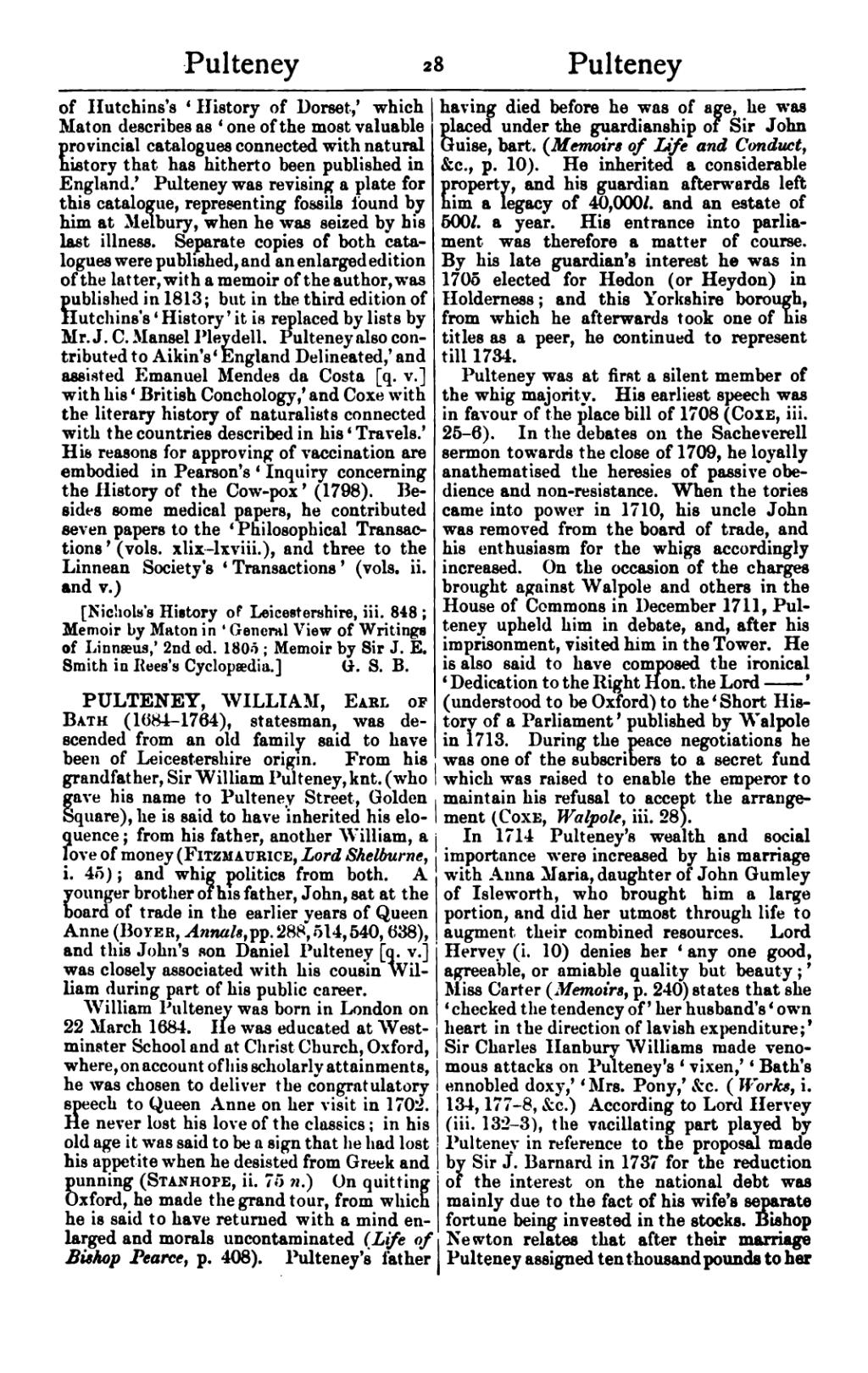of Hutchins's ‘History of Dorset,’ which Maton describes as ‘one of the most valuable provincial catalogues connected with natural history that has hitherto been published in England.’ Pulteney was revising a plate for this catalogue, representing fossils found by him at Melbury, when he was seized by his last illness. Separate copies of both catalogues were published, and an enlarged edition of the latter, with a memoir of the author, was published in 1813; but in the third edition of Hutchins's ‘History’ it is replaced by lists by Mr. J. C. Mansel Pleydell. Pulteney also contributed to Aikin's ‘England Delineated,’ and assisted Emanuel Mendes da Costa [q. v.] with his ‘British Conchology,’ and Coxe with the literary history of naturalists connected with the countries described in his ‘Travels.’ His reasons for approving of vaccination are embodied in Pearson's ‘Inquiry concerning the History of the Cow-pox’ (1798). Besides some medical papers, he contributed seven papers to the ‘Philosophical Transactions’ (vols. xlix–lxviii.), and three to the Linnean Society's ‘Transactions’ (vols. ii. and v.).
[Nichols's History of Leicestershire, iii. 848; Memoir by Maton in ‘General View of Writings of Linnæus,’ 2nd ed. 1805; Memoir by Sir J. E. Smith in Rees's Cyclopædia.]
PULTENEY, WILLIAM, Earl of Bath (1684–1764), statesman, was descended from an old family said to have been of Leicestershire origin. From his grandfather, Sir William Pulteney, knt. (who gave his name to Pulteney Street, Golden Square), he is said to have inherited his eloquence; from his father, another William, a love of money (Fitzmaurice, Lord Shelburne, i. 45); and whig politics from both. A younger brother of his father, John, sat at the board of trade in the earlier years of Queen Anne (Boyer, Annals, pp. 288, 514, 540, 638), and this John's son Daniel Pulteney [q. v.] was closely associated with his cousin William during part of his public career.
William Pulteney was born in London on 22 March 1684. He was educated at Westminster School and at Christ Church, Oxford, where, on account of his scholarly attainments, he was chosen to deliver the congratulatory speech to Queen Anne on her visit in 1702. He never lost his love of the classics; in his old age it was said to be a sign that he had lost his appetite when he desisted from Greek and punning (Stanhope, ii. 75 n.) On quitting Oxford, he made the grand tour, from which he is said to have returned with a mind enlarged and morals uncontaminated (Life of Bishop Pearce, p. 408). Pulteney's father having died before he was of age, he was placed under the guardianship of Sir John Guise, bart. (Memoirs of Life and Conduct, &c., p. 10). He inherited a considerable property, and his guardian afterwards left him a legacy of 40,000l. and an estate of 500l. a year. His entrance into parliament was therefore a matter of course. By his late guardian's interest he was in 1705 elected for Hedon (or Heydon) in Holderness; and this Yorkshire borough, from which he afterwards took one of his titles as a peer, he continued to represent till 1734.
Pulteney was at first a silent member of the whig majority. His earliest speech was in favour of the place bill of 1708 (Coxe, iii. 25–6). In the debates on the Sacheverell sermon towards the close of 1709, he loyally anathematised the heresies of passive obedience and non-resistance. When the tories came into power in 1710, his uncle John was removed from the board of trade, and his enthusiasm for the whigs accordingly increased. On the occasion of the charges brought against Walpole and others in the House of Commons in December 1711, Pulteney upheld him in debate, and, after his imprisonment, visited him in the Tower. He is also said to have composed the ironical ‘Dedication to the Right Hon. the Lord——’ (understood to be Oxford) to the ‘Short History of a Parliament’ published by Walpole in 1713. During the peace negotiations he was one of the subscribers to a secret fund which was raised to enable the emperor to maintain his refusal to accept the arrangement (Coxe, Walpole, iii. 28).
In 1714 Pulteney's wealth and social importance were increased by his marriage with Anna Maria, daughter of John Gumley of Isleworth, who brought him a large portion, and did her utmost through life to augment their combined resources. Lord Hervey (i. 10) denies her ‘any one good, agreeable, or amiable quality but beauty;’ Miss Carter (Memoirs, p. 240) states that she ‘checked the tendency of’ her husband's ‘own heart in the direction of lavish expenditure;’ Sir Charles Hanbury Williams made venomous attacks on Pulteney's ‘vixen,’ ‘Bath's ennobled doxy,’ ‘Mrs. Pony,’ &c. (Works, i. 134, 177–8, &c.). According to Lord Hervey (iii. 132–3), the vacillating part played by Pulteney in reference to the proposal made by Sir J. Barnard in 1737 for the reduction of the interest on the national debt was mainly due to the fact of his wife's separate fortune being invested in the stocks. Bishop Newton relates that after their marriage Pulteney assigned ten thousand pounds to her
